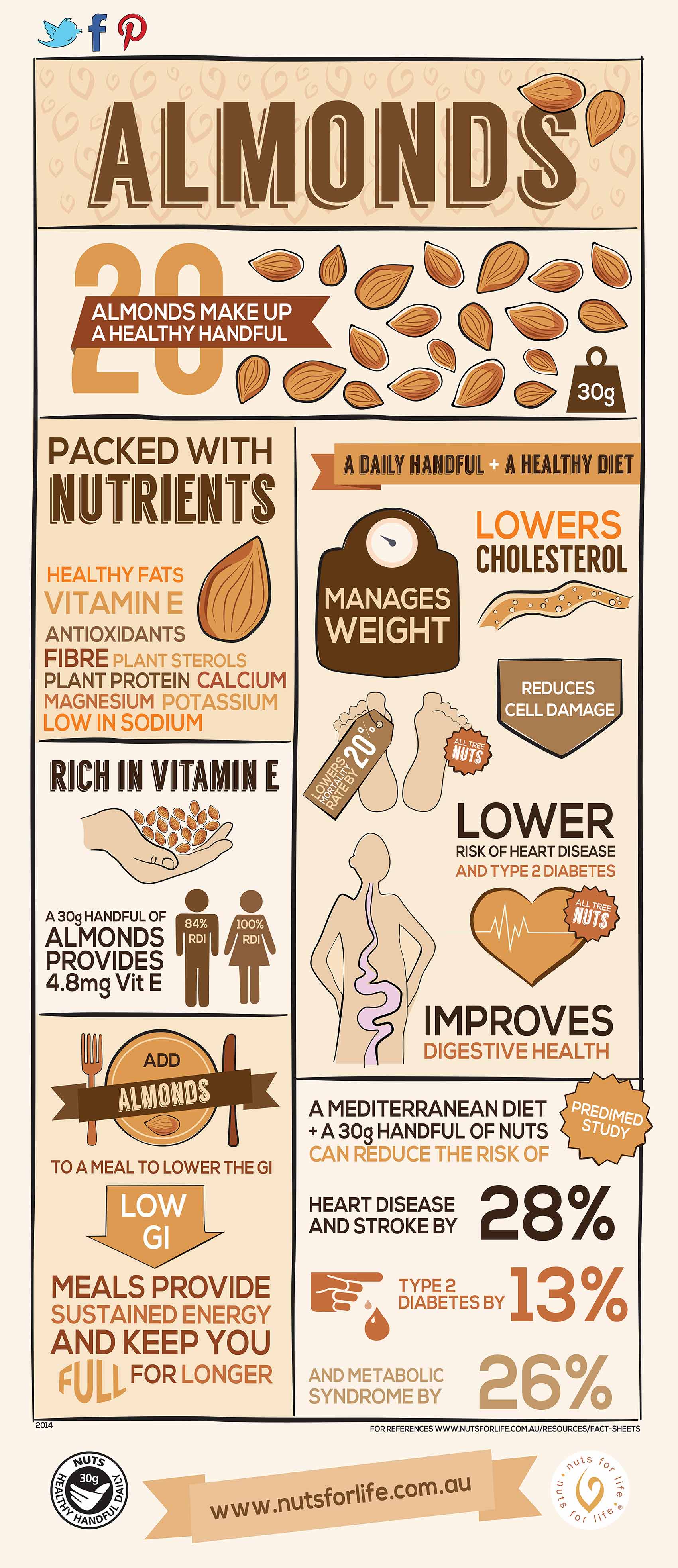Nuts are great for people, and almonds are one of the tastiest. But can dogs eat almonds as well, and are almonds for dogs safe to consume? What about the health benefits from feeding almonds to dogs, and are there any side effects? Let's take a closer look.
If you've been wondering, “can I give my dog almonds,” the answer is YES – but only in extremely small amounts. Almonds are good for dogs and may have some health benefits, but if you give just a tiny bit too much, there may be serious side effects.
In this article, I will analyze what this food is and if almonds are good for dogs, how many almonds a dog can eat and what are the benefits and side effects of almonds for dogs.
ALSO READ: Can Dogs Eat Macadamia Nuts?
Table of Contents
What are almonds?
An almond is a type of edible seed that comes from a tree of the same name. These seeds are closely related to plums, peaches and cherries (which you can also give to dogs).
Almonds are high in healthy unsaturated fats and provide good nutritional value. They contain essential vitamins and minerals, making this edible seed (often called a nut) a potent health force.
This is what raw almonds look like:

In humans, studies have shown that almonds can help lose weight due to them being very weight-loss friendly food and speeding up metabolism (1, 2, 3). Further research showed how they improve heart health and blood pressure (4, 5, 6).
Almonds can regulate blood sugar levels and help people with diabetes (7, 8, 9). Also, including almonds in the diet will improve gut bacteria and digestive health (10, 11).
But can dogs eat almonds and reap the same health benefits as humans? And what about the adverse effects of feeding almonds to dogs? There hasn't been as much research done on almonds for dogs, but we can draw some conclusions anyway, so let's take a look.
Almonds for Dogs 101
Can Dogs Eat Almonds?
 So, can dogs eat almonds? Yes, technically – almonds are good for dogs.
So, can dogs eat almonds? Yes, technically – almonds are good for dogs.
However, the caveat is that almonds are only safe for dogs when fed in extremely small amounts, meaning one or two almond seeds at a time.
The best choice are natural and raw, completely unflavored and unsalted almonds.
Feeding large amounts of almonds for dogs is not recommended because that will result in adverse effects and potentially serious health problems which we discuss below.
Here are the nutrients that are healthy for dogs found in almonds:
- Vitamin B2
- Vitamin E
- Magnesium
- Manganese
- Potassium
- Phosphorus
- Iron
Almonds are also a good source of healthy dietary fats, protein and carbohydrates. This and all of the above are nutrients that dogs can benefit from, but how much can they actually absorb and how many almonds are good for dogs to only get the benefits?
ALSO READ: Can Dogs Eat Cantaloupe?
5 Potential Benefits of Almonds for Dogs
 So are almonds good for dogs? Yes, when fed in very small amounts.
So are almonds good for dogs? Yes, when fed in very small amounts.
When you give your dog almonds and restrict the serving to 1-2 almond seeds, below are the potential health benefits your canine may reap from this addition to his diet.
1. Almonds contain Vitamin B2 that provides several health benefits.
Vitamin B2 (riboflavin) is a very powerful antioxidant that has been studied extensively in people and has been shown to improve health significantly in many areas.
For dogs, Vitamin B2 (riboflavin) may help with the prevention of cataracts, aid in strong bone growth and reproduction, help with red blood cell creation in the canine body.
Vitamin B2 is also critical for dog's healthy skin, nail, and hair growth. Vitamin B2 may also prevent bladder stone formation.
2. Vitamin E’s antioxidant properties ward off various diseases.
Almonds contain a good amount of Vitamin E, which has been shown to be a crucial antioxidant for the prevention of heart disease and cancer.
Vitamin E may be the reason why almonds are very good for heart health. Vitamin E from almonds may also reduce blood pressure and prevents cell damage in dogs.
3. Magnesium improves many important body functions.
Magnesium found in almonds promotes bone growth and protein production in a canine's body. It is also known for helping the body to better absorb all vitamins and minerals.
Furthermore, magnesium has been widely studied for its positive effect on all living organisms, particularly in the areas of bone health and blood pressure.
4. Potassium helps to promote vital body functions in dogs.
Potassium is another important nutrient that all dogs need in their diet. Almonds contain small amounts of potassium which maintains healthy blood vessel functions and replaces lost electrolytes in the canine's body.
Potassium also plays an important role in strengthening muscle development in dogs.
5. Antioxidants in almonds are super-powered health receptors.
Just like for humans, antioxidants (vitamins) are vitally important for dogs because they prevent the oxidative stress that damages cells in the canine body.
A large amount of antioxidants found in almonds may, in theory, prevent several diseases in dogs such as canine cancer, and assist in slowing the aging process in dogs.
RELATED: Can Dogs Eat Marshmallows?

“So, can I give my dog almonds?”
Yes, almonds are good for dogs in very small amounts and are not toxic to dogs. You can feed your dog 1-3 almond seeds at a time, but not more.
Feeding a small serving of almonds for dogs ensures that they can get some of the health benefits of almonds for dogs without exposing them to the risks of potential side effects.
Almonds fed in excess, which depends on the size of your dog (for some dogs that means more than 3 almond seeds), can increase the risk of toxicity or at the very least some minor health problems and side effects.
The Bottom Line: A very small amount of almonds are safe for your dog to eat. More than 3 almond seeds at a time may result in minor health problems in dogs.
5 Potential Side Effects of Almonds for Dogs
 As we discussed above, almonds are good for dogs in very small amounts and can even benefit their dogs. However, too many almonds for dogs can result in some side effects.
As we discussed above, almonds are good for dogs in very small amounts and can even benefit their dogs. However, too many almonds for dogs can result in some side effects.
In fact, in certain cases almonds can pose as a health threat even to people. They're especially risky for people with allergies (12), pose a risk of kidney stones in some individuals (13) and may inhibit absorption of certain minerals, like calcium (14).
Feeding too many almonds for dogs pose the below five health dangers:
1. Gastrointestinal upset.
Almonds are very high in unsaturated fats which – when given in large amounts – are not easy for dogs to digest. A loss of appetite, vomiting, and diarrhea may result.
2. Obstruction and choking.
Because of their small size, almonds can be a potential obstruction and choking threat to dogs, especially if your pet gets a hold of them without you around.
Dogs tend to swallow rather than chew, and an almond can get caught in a dog’s stomach, esophagus, or windpipe. Owners of small breed dogs should be particularly vigilant.
3. Risk of canine pancreatitis.
Like with many other food items, too much of certain nutrients may pose a risk of canine pancreatitis, especially when exposed on a regular basis.
Almonds have high levels of unsaturated dietary fat. Even though it's healthy in small amounts, feeding large amounts to your dog may result in pancreatitis, an inflammation of the dog's pancreas, where the pancreas becomes incapable of functioning properly.
Pancreatitis causes significant pain and discomfort for your dog. The dog may vomit repeatedly, lose his appetite, and his stomach may be tender and swollen.
This condition is classified as an emergency and requires a dog to be hospitalized. At the hospital, the dog will be given IV fluids, pain medications, and antibiotics for recovery.
4. Water retention in dogs.
With the exception of raw almonds, other versions of this nut are often heavily salted (and would not be a good option for dogs anyway for many other reasons). Excess salt and sodium can lead to water retention in dogs just as it does in people.
Excess water retention is particularly dangerous for dogs with heart disease. Other side effects include canine bloat, intestinal pain and discomfort, and vomiting.
5. Sodium overdose in dogs.
Dogs are incapable of breaking down salt/sodium as easily as people can, and the high levels of sodium in certain types of almonds can pose real health dangers.
Dogs that overdose on sodium will drink excess water, leading to more frequent urination and immense stresses on the circulatory and gastrointestinal systems.
A sodium overdose in dogs may result in diarrhea, canine bloat, vomiting, and in extremely serious cases, seizures.
Summary:
Can Dogs Eat Almonds?
 In conclusion, dogs can eat almonds. In fact, almonds are good for dogs, but only when given in very tiny amounts (1-3 almond seeds per serving).
In conclusion, dogs can eat almonds. In fact, almonds are good for dogs, but only when given in very tiny amounts (1-3 almond seeds per serving).
If you must, then it's best to give natural, raw, unflavored, unsalted almonds.
Because of the potential dangers that can occur if a dog is overfed on almonds, it is not recommended that they are given this nut seed as regular treats.
Do your best to keep any almonds in your home out of the reach of your dog to prevent an accidental eating binge and overdose of almonds for dogs.
Overall, consider a better, less potentially harmful treat to feed your dog instead of almonds on a regular basis, such as bananas.
References
READ NEXT: 6 Must-Know Tips for Making Your Own Homemade Dog Food













